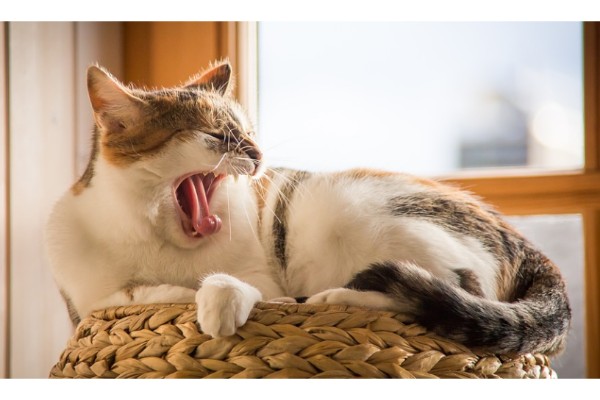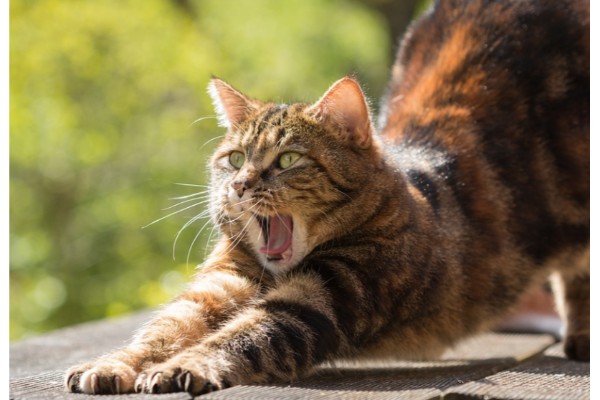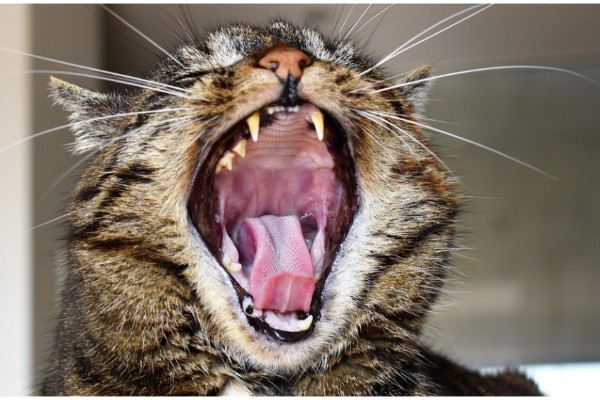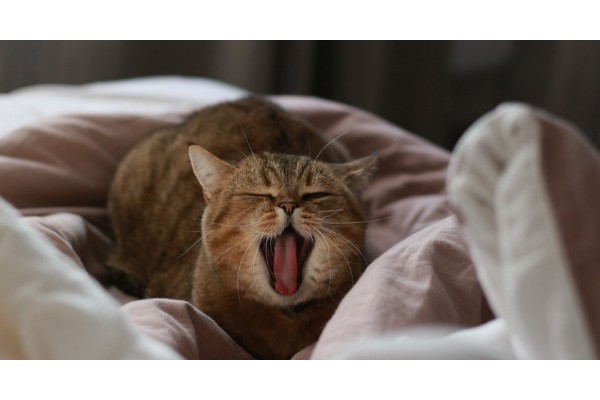Just like humans, cats yawn, though it’s not always an indication that they’re tired. Examine the various causes of your cat’s yawning and what they are trying to tell you.
Table of Contents
Do Cats Yawn?
Yawning is a universal behavior shared by humans and the majority of animal species, including our feline friends, so the answer is yes, cats do yawn. Like people and other animals, cats also yawn by opening their mouths wide, inhaling deeply, and then exhaling quickly.
Although the process is similar, it is thought that a cat’s yawn doesn’t last as long as a human’s, which scientists attribute to gray matter and brain size. The theory is that yawning delivers additional “cooler” blood to the brain as a way to keep the temperature optimally balanced. Animals with larger brains and more neural connections need “cooler” blood to get rid of the heat.
Why Do Cats Yawn?

Although they have some compelling hypotheses, scientists are unable to definitively explain why cats (or humans, for that matter) yawn.
Contentment
Your dog and cat may be yawning for different reasons if you have both of them in your home. Dogs who yawn may be afraid or anxious, according to Dr. Lisa Goin, a partner doctor with Heart + Paw in Glen Mills, Pennsylvania, however, “yawning in cats typically indicates they are relaxed and content, especially if they are in their normal environment.
Sleepiness And Boredom
The same us, cats yawn when they are tired or bored. In an effort to achieve alertness, yawning causes an increase in blood flow to the head (in both humans and birds). This may contribute to the explanation of why people yawn more in the afternoon or evening when body temperatures are typically higher.
Behavioral Causes
Dogs who are anxious or excited may yawn, according to Dr. veterinarian Cathy Lund of Providence, Rhode Island’s City Kitty Veterinary Care for Cats. Though “Cats don’t seem to react to excitement in the same way, and their yawns seem to be exclusively related to when they are sleeping or waking up.”
However, Marilyn Krieger, a certified cat behavior consultant and owner of The Cat Coach in the San Francisco Bay area, notes that cats may yawn when in conflict or to let other cats know they’re not a threat.
Medical Causes
Yawning is a normal, involuntary behavior that, by itself, is unrelated to any serious disease. On the other hand, a cat that yawns frequently may have an illness like resorptive lesions or oral ulcers. If this is the case, pet owners may notice their cats yawning while in pain, spitting up food, and losing interest in food.
“Other signs that yawning may be due to a medical condition rather than behavioral include excessive drooling, difficulty eating, or rubbing at the face,” says Goin
Does A Cat’s Yawn Cause The Yawn Of Other Cats?

There is solid proof that yawning is a response to seeing other members of one’s own species yawn in both humans and other animal species, such as dogs, chimpanzees, and budgerigars. According to researchers, the phenomenon known as contagious yawning is connected to strong social ties and empathy.
Lions have been seen to yawn contagiously, which is thought to be a way for them to coordinate their movements and form a sense of cohesion. It’s still up for debate whether or not our own cats yawn contagiously. Lund claims that cats seem to yawn for the same causes as people. “Although we are unsure if a cat’s yawn might cause their friends to yawn as well.”
Do Cats Catch Human Yawns?
Have you ever yawned because someone else did?
Do you currently yawn just from thinking about yawning?
It may soon be possible to determine whether cats have empathy for their owners or if they simply view them as helpful sources of food and shelter, which is the age-old question.
In an investigation into whether cats “catch” yawns from their owners, researchers at the University of Sussex are looking for cat and owner pairs to participate.
Yawns are contagious among people who consider each other to be a member of the same social group, according to well-established human psychology. Dogs have been shown to “catch” their owners’ yawns in prior studies, and other social animals like budgerigars, rats, and chimpanzees have also shown signs of contagious yawning. Additionally, recent studies have revealed that lions yawn to communicate with one another.
The experiment is being run by Karen Hiestand. She is a doctoral researcher at the University of Sussex’s School of Psychology in the Mammal Communication and Cognition Group with a focus on anthropology. Karen said:
“Although it is obvious that some cats have a special bond with their owners, does empathy play a part in that bond?
“Contagious yawning has been linked to empathy in humans and this claim has also been debated for dogs that ‘catch’ human yawns.
“In contrast to dogs, which are highly social and have socially evolved traits, domestic cats originated from a solitary ancestor. I’m hoping that this research will shed more light on how we interact with these two species and how they developed into our most frequent animal companions.”
Cat owners who are interested in participating must first complete a brief online survey. The experiment can then be tried at home with a cat by the owner after following instructions. Participants should send video recordings of the experiment to the researchers for behavior analysis.

Should You Be Concerned About Cat Yawns?
Cat yawning typically doesn’t indicate anything amiss. In fact, “Relaxed and happy cats will yawn with tiredness or on awakening,” says Lund. “In general, tense or stressed cats won’t yawn. Their vigilance will actually stop them from acting in that way.”
However, there are two circumstances that should make you take your pet to the vet.
yawning that is accompanied by additional symptoms of illness According to Dr., a cat exhibiting additional breathing changes should be examined right away. At the Just Cats Veterinary Hospital in Stamford, Connecticut, Sasha Gibbons practices as an associate veterinarian. This includes, according to her, unusual noises, panting like a dog, blue or pale gums, faster breathing than usual, or exerted effort when moving air into and out of the lungs. Additionally, “The cat should be examined by a veterinarian if they notice that it is not eating well, is lethargic, is vomiting or diarrhea excessively is drinking more water, or is hiding more often.”
Excessive yawning. “Whenever there are any changes in behavior, even increases in yawning frequency, cats need to be examined by a veterinarian,” says Krieger, as that might indicate a more serious condition.
